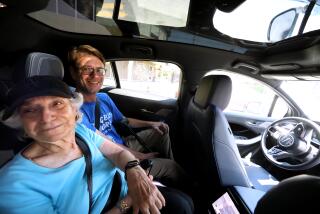Road Map for Reform : Blind Man Lobbies Bus Drivers to Announce Stops
It is the morning commute on RTD Line 483 and David Wolfe is riding shotgun for the blind.
As the full bus trundles toward downtown Los Angeles from Pasadena, Wolfe sits in his familiar seat up front, alongside his guide dog, Ivy, and listens .
What Wolfe does not hear bothers him. On a half-hour ride to Union Station, the driver only occasionally announces the bus’s location, and in a mumble barely audible over traffic.
“Any time the bus turns onto a new street it has to be called out,” Wolfe said after getting off the bus. “Otherwise I don’t know where I am.”
Because the driver announced some cross streets, Wolfe said: “He at least made the attempt, but I think he still blew it.”
In the last three months, Wolfe, 30, has launched a one-man crusade to ensure that bus drivers around Southern California announce all significant locations to their passengers.
His campaign packs some wallop, too, because the Americans With Disabilities Act orders bus operators to announce major intersections, transfer points and places of interest. The announcements are to be made routinely, the law says, not just when a disabled person is riding. Failure to comply can lead to a loss in federal funding or lawsuits by riders.
“It’s just utter insensitivity when you don’t assist a disabled person,” Wolfe said. “It just takes a little common sense.”
Advocates for the disabled say that verbal cues from a bus driver are the key to a serene and successful ride. They not only help locate destinations, but provide a sense of place. Disabled riders count on the early warnings to give them more time to disembark.
Wolfe began his campaign in January, bombarding bus operators with phone calls and letters. This month, he shifted gears by issuing personal “citations” to bus companies whose drivers fail to announce stops. The 20 citations he has issued list the company, line, time of travel and nature of violation--for instance, failure to call out a significant landmark.
If there is no response to the complaints, Wolfe said he is prepared to send copies to the federal Department of Transportation and the Los Angeles County Board of Supervisors.
At Foothill Transit in the San Gabriel Valley, officials have gotten the message.
Foothill Transit drivers have made dramatic improvements in making announcements since his campaign began, Wolfe said. And he reinforced his message last week, when he met with many of the district’s 239 drivers.
Wolfe said he will turn his attention to the region’s two biggest bus operators, Southern California Rapid Transit District and the Orange County Transit District.
Born into a blue-collar family of auto body workers in South Bend, Ind., Wolfe said his parents encouraged him to strike out on his own, despite his blindness. Now living in Pasadena, he has evolved into a self-styled advocate for the disabled.
When the Center for Independent Living in Glendora lost government funding and closed this month, Wolfe quickly established his own office to provide advice to the disabled. He spends five days a week at a Lutheran church in Baldwin Park, in a lonely office, waiting for the infrequent phone calls from people who need apartments, counseling or help cutting government red tape.
Wolfe makes it no secret that he would like to make a living at such work. But none of the agencies he has contacted have taken him up on the offer, so he counts on government disability payments to get by.
Critics acknowledge Wolfe’s tenacity, but they say it seems to be directed more at promoting himself than serving the disabled.
“I think he is compulsive about trying to get himself in the newspaper,” said one woman who has confronted Wolfe on other issues involving the disabled. “He is looking for a little ink from every publication in town.”
But a former employee of the Center for Independent Living said Wolfe’s demands for attention do not diminish his altruism. “It comes from his heart,” said Patty Wilson. “It’s not just for himself.”
On a recent trip from Pasadena to Fullerton for an appointment with an eye doctor, Wolfe said four Orange County transit drivers and two RTD drivers failed to announce their routes, including an Orange County driver who forgot his request for a specific stop.
Officials in both transit agencies said drivers receive regular training in communicating with passengers. Both agencies have sent memos to reinforce the importance of announcing stops.
Dan Ibarra, director of transportation for the RTD, said its 4,600 drivers are seldom criticized by the public for failing to announce stops. Orange County transit spokeswoman Joanne Curran said her agency also has received few complaints.
Wolfe attributes this to disabled people being “beaten down so many times they have given up.”
He said he plans to continue riding the buses, and writing citations, even if he is not winning friends.
“Some people say I have a chip on my shoulder or want some special favor,” Wolfe said. “But I just want what is everyone else’s right.”
More to Read
Sign up for Essential California
The most important California stories and recommendations in your inbox every morning.
You may occasionally receive promotional content from the Los Angeles Times.











